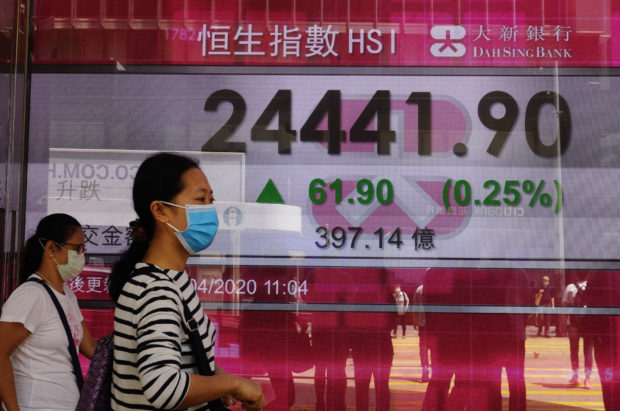Asian shares mixed as oil prices fall back; China cuts rate
BANGKOK — Shares were mixed in Asia on Monday after China cut a key interest rate to help cushion the impact of the pandemic on its economy.

People wearing face masks walk past a bank electronic board showing the Hong Kong share index at Hong Kong Stock Exchange Monday, April 20, 2020. Shares were mixed in Asia on Monday, while oil prices have fallen back. (AP Photo/Vincent Yu)
Benchmarks rose Monday in Hong Kong and Shanghai but fell in Tokyo. Oil prices were lower.
A fresh crop of grim economic data is expected this week after a worldwide rally on Friday that pushed the S&P 500 up 2.7%.
Japan reported Monday that its exports fell nearly 12% in March from a year earlier as shipments to its two biggest markets, the U.S. and China, slipped.
Providing a lift for Chinese markets, banks cut the benchmark interest rate, called the 1-year loan prime rate, by 0.20 basis points to 3.85%, seeking to boost the economy after it contracted by 6.8% in the first quarter of the year.
The 5-year loan prime rate was cut by 10 basis points to 4.65%. The cuts came as no surprise given the economic shock of the last quarter, the worst downturn since perhaps the 1965-75 Cultural Revolution.
The People’s Bank of China paved the way for the monetary easing last week by reducing by 0.2% a rate called the medium term lending facility, which forms the basis for the loan prime rate. The cuts reduce short-term borrowing costs for banks.
Article continues after this advertisementChina’s central bank has used various targeted moves to ease the pandemic’s blow to the economy. “As employment conditions remain weak and external demand is being held back by lockdowns elsewhere in the world, we think the People’s Bank will take further steps to prop up activity,” economists at Capital Economics said in a commentary.
Article continues after this advertisementThe Hang Seng index in Hong Kong gained 0.2% to 24,419.99 while the Shanghai Composite index added 0.3% to 2,847.13. Shares also rose in South Korea, gaining 0.2% to 1,919.14.
But Japan’s Nikkei 225 index gave up 0.9% to 19,713.77, while the S&P/ASX 200 declined 1.3% to 5,418.90. Shares also fell in Taiwan but rose in Southeast Asia.
Friday’s rally was driven by wisps of optimism over reports on early progress in a possible treatment for the coronavirus and moves by President Donald Trump to nudge states toward reopening businesses and other activities shut down to help stem the spread of the pandemic, which has killed more than 165,000 people and infected at least 2.4 million worldwide, 760,000 of them in the U.S.
The S&P 500 added 75 points to 2,874.56, while the Dow Jones Industrials average advanced 3% to 24,242.49. The Nasdaq composite index gained 1.4% to 8,650.14.
By early Monday, the future for the S&P 500 was 0.2% lower while that for the Dow had fallen 0.3%.
Treasury yields remained extremely low. The yield on the 10-year Treasury was steady at 0.64%. It started the year near 1.90%. Bond yields drop when their prices rise, and investors tend to buy Treasurys when they’re worried about the economy.
The market’s gains were widespread Friday, across all 11 sectors that comprise the S&P 500, which has climbed more than 27% since hitting a low on March 23.
The most recent gains have been powered by hopes that the pandemic may be leveling off in some of the world’s hardest-hit areas. The rally started after the U.S. government and Federal Reserve promised massive aid for the economy.
But the S&P 500 is still down roughly 16% from the record set in February as numbers roll in and show the cataclysmic damage being done to the economy.
Roughly 22 million U.S. workers have lost their jobs in the last month as businesses shut down.
Banks are bracing for consumers and businesses to default on billions of dollars in loans, and no one can say for sure when the economy will get back to anything approximating “normal.”
In other trading, benchmark U.S. crude lost $1.32 to $23.71 per barrel in electronic trading on the New York Mercantile Exchange.
It lost 50 cents to $25.03 per barrel on Friday. Brent crude, the international standard for pricing, gave up 35 cents to $27.73 per barrel.
The dollar fetched 107.84 Japanese yen, up from 107.54 yen on Friday. The euro weakened to $1.0862 from $1.0875.
GSG
For more news about the novel coronavirus click here.
What you need to know about Coronavirus.
For more information on COVID-19, call the DOH Hotline: (02) 86517800 local 1149/1150.
The Inquirer Foundation supports our healthcare frontliners and is still accepting cash donations to be deposited at Banco de Oro (BDO) current account #007960018860 or donate through PayMaya using this link.